Residential proxies are a key part of modern web intelligence and automation. These proxies send traffic through actual devices connected to residential ISPs, making them look like real users to websites. Unlike datacenter proxies, which can be easily identified due to repetitive IP ranges or fast access patterns, residential proxies provide authenticity and are harder to detect. They offer IP addresses that belong to real people in various locations, which leads to better success rates for tasks like data scraping, market research, and automating social media.
In today’s data‑driven world, getting access to geo‑restricted content, insights about competitors, and unbiased search results is vital. Residential Proxy Providers offer a reliable and scalable solution. Digital marketers, e‑commerce analysts, cybersecurity firms, and SEO specialists often use them to mimic real user behavior. As bot detection systems become more sophisticated, the need for clean, legitimate residential IPs keeps increasing.
How Residential Proxies Work
On a technical level, a residential proxy acts as a middleman between a client, such as a bot or script, and a target server. When a request is made, it routes through a residential IP—typically obtained from a peer-to-peer network of willing users or through agreements with ISPs. The website receiving the request sees it as coming from a residential user, not a data center. This hides bot activity and helps bypass IP restrictions, CAPTCHAs, and geo-blocks.
Most residential proxy networks feature two main modes: rotating and sticky sessions. Rotating proxies change IPs with every request or after a set period (e.g., every 5 minutes). This is ideal for scraping at scale without risking IP bans. Sticky proxies keep the same IP address for a longer duration, which is perfect for session-based tasks like logging into social media accounts or carrying out e-commerce actions requiring a consistent identity.
Key Use Cases of Residential Proxies
Residential proxies have various important business uses. One prominent use is web scraping. Whether collecting pricing data from travel websites or pulling product listings from marketplaces like Amazon and Walmart, residential proxies lower the chance of getting blocked. Since the IPs are connected to real residential networks, websites are less likely to flag these requests.
These proxies are also crucial for ad verification. Many companies run geo-targeted advertising campaigns, and ensuring that ads display correctly and without fraud requires simulating browsing from specific locations. Residential proxies let marketers and advertisers monitor campaigns in different regions without the need to travel or rely on secure VPNs.
In social media automation and account management, residential proxies help avoid bans. Platforms like Instagram, Facebook, and LinkedIn have strict bot-detection systems, and managing multiple accounts without raising suspicion is almost impossible without residential IPs. The same reasoning applies to sneaker purchasing and ticket sales, where high-speed bots are used to make purchases the moment products become available. Residential proxies offer the camouflage needed to avoid bans and CAPTCHAs.
Additionally, cybersecurity experts use residential proxies for penetration testing, gathering threat intelligence, and examining malicious domains. Even in academic and research settings, scholars depend on residential proxies to bypass paywalls, collect content in multiple languages, or access region-locked archives.
Benefits Over Other Proxy Types
Compared to datacenter and mobile proxies, residential proxies provide an ideal balance of reliability, cost, and authenticity. Datacenter proxies are often faster and cheaper but frequently flagged because of their predictable IP blocks and lack of real ISP connection. Mobile proxies, while appearing the most legitimate to bot detectors, can be very expensive and excessive for many uses.
Residential proxies strike a middle ground. They are more believable than datacenter proxies yet more affordable than mobile ones. Since they come from actual devices on broadband networks, they usually have higher trust levels from websites and typically face fewer restrictions. This makes them suitable for tasks requiring both legitimacy and scalability. If you need that balance between credibility and cost, many suppliers allow you to acquire residential proxies to gain legitimate, scalable access for web testing and data collection.
Another key advantage is the range of geolocation targeting. Many residential proxy providers allow targeting at the city or ASN level. This is crucial for activities like localized SEO monitoring, price comparison tools, or localized app testing, where digital experiences vary significantly by geography.
List of Best Residential Proxy Providers
1. Bright Data
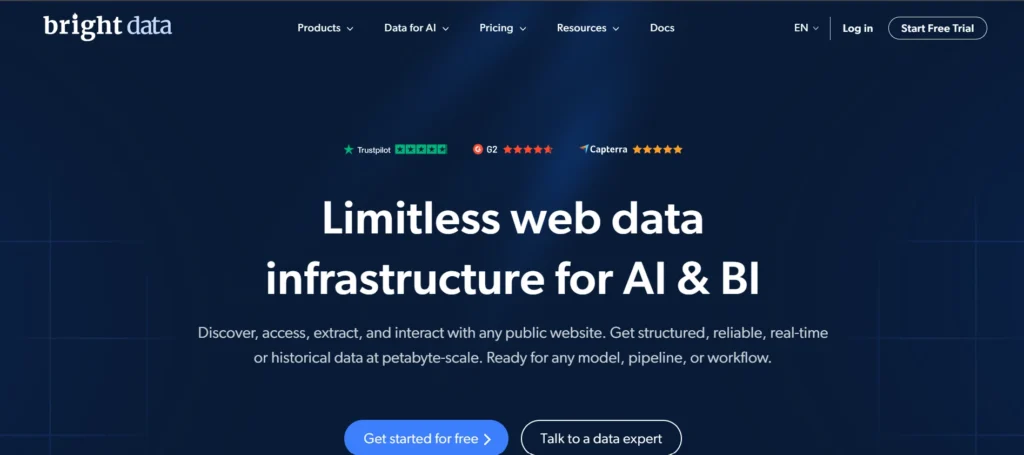
Bright Data, formerly known as Luminati, is a top-tier residential proxy provider trusted by Fortune 500 companies, market intelligence platforms, and developers of AI cybersecurity tools. It boasts a vast network of over 72 million real residential IPs, offering exceptional global reach and reliability. What sets Bright Data apart is its advanced control suite including the Proxy Manager, customizable session rotation, and precise geotargeting—making it ideal for complex data extraction and security-focused use cases.
Bright Data is also known for ethically sourcing its data, which ensures transparency and legal compliance. Its robust infrastructure can bypass advanced anti-bot systems, making it ideal for ad verification, SEO monitoring, eCommerce scraping, and more.
Features:
- 72M+ real residential IPs across 195+ countries
- Powerful proxy management and rotation tools
- Geotargeting down to city and ISP level
- Integration with Puppeteer, Selenium and more automation tools
- Dashboard with real-time performance analytics
Pricing:
- Starts at $15/GB
- Enterprise plans available for high-volume use
2. Smartproxy
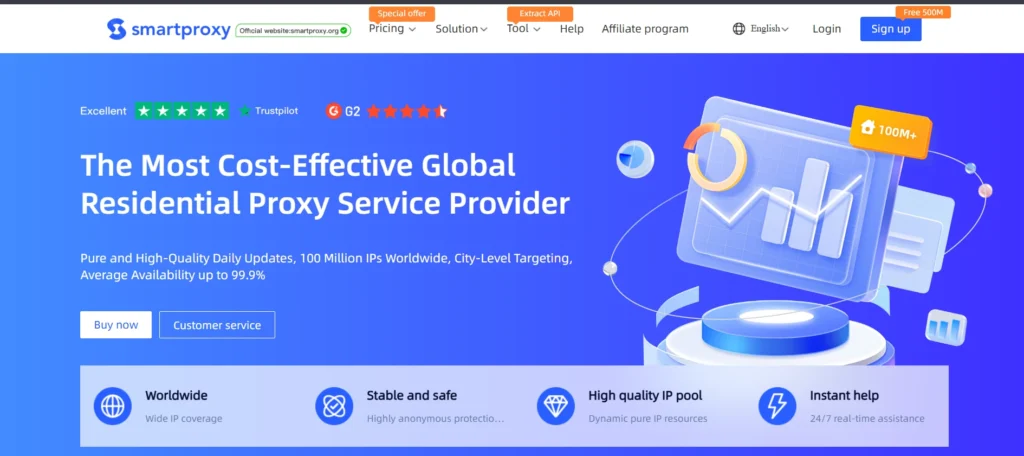
Smartproxy is a versatile and user-friendly residential proxy provider, offering access to over 55 million IPs across more than 195 countries. Designed for speed and simplicity, it caters to developers, digital marketers, and data analysts who need fast deployment, stable performance, and budget-friendly pricing. Users can choose between sticky and rotating sessions, making it ideal for tasks like ad verification, web testing, and sneaker botting.
What sets Smartproxy apart is its intuitive dashboard, VPN extensions for Chrome, and robust API support, making it suitable for both beginners and experienced professionals. With clear documentation, a low starting price, and reliable uptime, it’s a strong choice for small businesses, agencies, and solo practitioners looking to scale their data operations affordably.
Features:
- 55M+ IPs globally
- Sticky and rotating sessions
- Chrome and Firefox browser extensions
- Country and city-level targeting
- API and script integration support
Pricing:
- Starts at $8.50/GB (Micro Plan)
3. Oxylabs
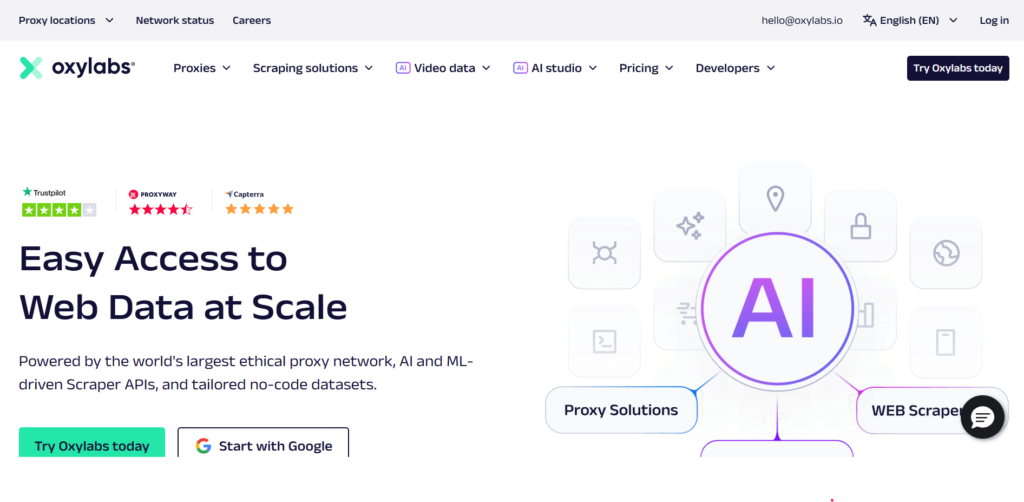
Oxylabs is a premium proxy provider recognized for its enterprise-level infrastructure and ethical sourcing model. It offers more than 100 million residential IPs with a focus on scalability, reliability, and compliance. Oxylabs is the preferred choice for large-scale data operations, including real-time price tracking, competitor analysis, and market research.
Its AI-powered Web Unblocker and Next-Gen Residential Proxies guarantee high success rates even on heavily protected sites. With detailed analytics and ISO-certified data security, Oxylabs provides an exceptional experience for companies handling sensitive or high-volume scraping tasks.
Features:
- 100M+ residential IPs
- AI-powered scraping tools and unblocker
- Customizable session and rotation options
- High concurrency for bulk operations
- ISO 27001 certified for data security
Pricing:
- Starts at $8/GB
4. SOAX
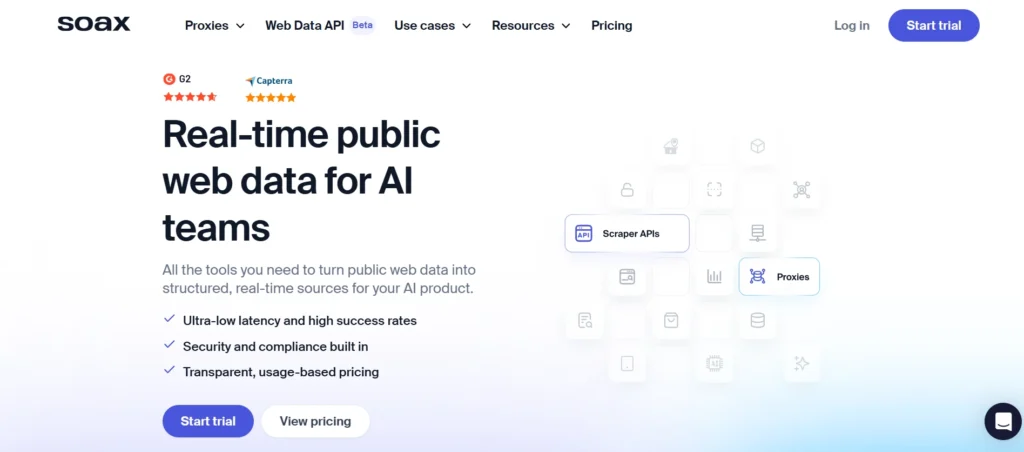
SOAX is known for its clean, filtered, and highly customizable proxy network, featuring over 5.5 million IPs worldwide. It provides precise control over IP selection with filters for country, city, ISP, ASN, and even carrier. This granularity is highly useful for professionals in ad verification, travel aggregation, and localized SEO testing.
SOAX prioritizes transparency and data quality, allowing users to see detailed IP usage stats and rotate sessions easily through its modern, user-friendly dashboard.
Features:
- 5.5M+ verified residential IPs
- ISP, city, and ASN-level targeting
- IP whitelisting and flexible session control
- Clean and transparent dashboard
- Ethical IP sourcing practices
Pricing:
- Starts at $6.99/GB
- Scale-based pricing for teams and enterprises
5. IPRoyal
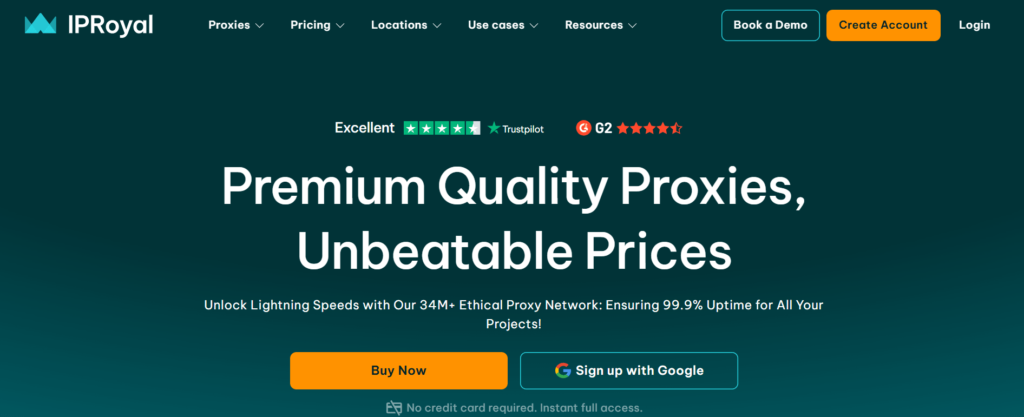
IPRoyal delivers an affordable residential proxy solution powered by more than 2 million ethically sourced IPs, thanks to its exclusive Pawns program. It balances cost-effectiveness with reliable performance, making it especially appealing to solo developers, startup founders, and sneaker resellers who need dependable proxies without overspending.
The platform supports both rotating and sticky sessions, allows global targeting, and offers seamless API integration. Its simple setup and user-friendly dashboard make it accessible even to those new to proxy services, while still providing enough flexibility to handle moderate scraping, automation, and data gathering tasks with ease.
Features:
- 2M+ ethically sourced residential IPs
- Sticky and rotating session support
- Real-time IP targeting by country
- API and simple dashboard controls
- No monthly minimum or lock-in
Pricing:
- Starts at $7/GB on a pay-as-you-go basis
6. GeoSurf

GeoSurf is a premium residential proxy provider for users who require high reliability, performance, and regional precision. With a network of over 2.5 million residential IPs, GeoSurf specializes in IPs from Tier-1 countries and offers detailed geographic targeting down to city and carrier levels.
Its dashboard provides interactive insights and allows easy integration with third-party tools for ad verification, localized testing, and content accessibility checks. GeoSurf’s IPs come from verified users and are updated regularly to minimize bans and improve uptime.
Features:
- 2.5M+ residential IPs across 130+ countries
- Precise city, region, and carrier targeting
- Intuitive dashboard with session management
- Ideal for ad fraud detection and market research
- Compatible with automation scripts and browser extensions
Pricing:
- Starts at $300/month for 38GB
- High-volume pricing available
7. NetNut
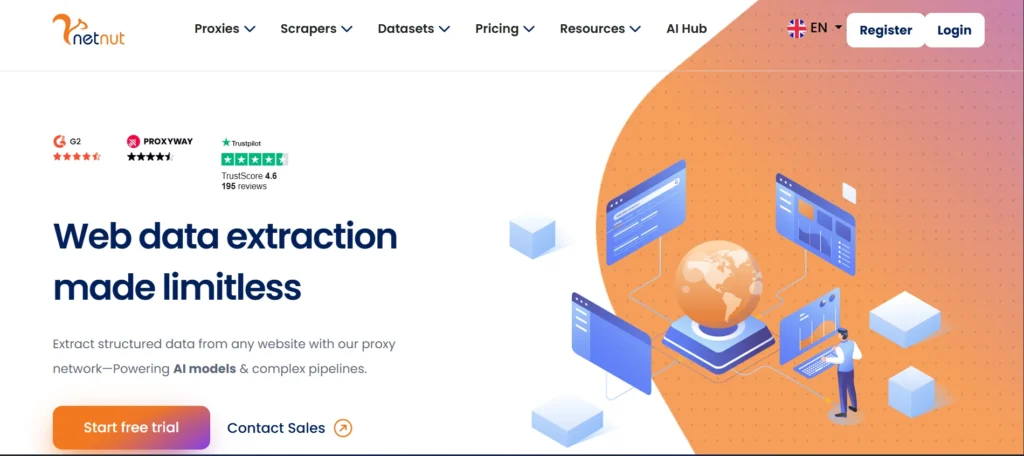
NetNut is a performance-focused residential proxy provider offering access to over 52 million IPs sourced through direct ISP partnerships. Unlike many providers that rely on peer-to-peer networks, NetNut’s non-peer-based infrastructure ensures faster speeds, higher stability, and lower latency, making it ideal for real-time data operations.
Geared toward data aggregators, ad tech firms, and SEO teams, NetNut supports rotating and sticky sessions, country-level targeting, and API access. Its dashboard is clean and professional, and the setup process is straightforward. For businesses that require fast, always-on residential proxies, NetNut is a strong, reliable option.
Features:
- 52M+ ISP-based residential IPs
- Non-peer, always-online IP network
- Fast response times with low failure rates
- Country and city-level targeting
- Scalable API and session control
Pricing:
- Starts at $350/month for 20GB
- Custom plans for high usage
8. PacketStream
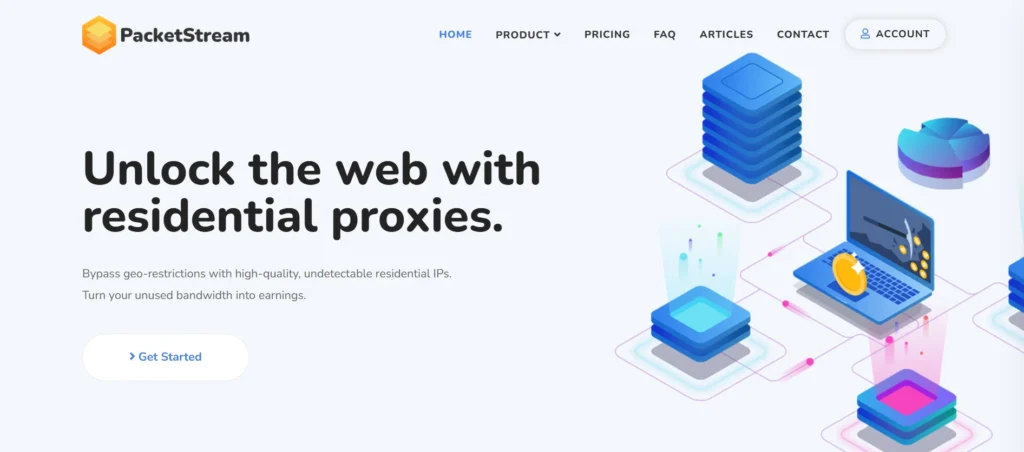
PacketStream is an affordable residential proxy network that attracts freelancers, researchers, and small businesses. With around 7 million IPs, it operates on a peer-sharing model, allowing users to buy proxies and earn money by selling their unused bandwidth.
This makes PacketStream one of the few community-driven proxy platforms. While it may not be suitable for high-speed enterprise scraping, it is a cost-effective choice for moderate-scale tasks like social media research, localized ad tracking, and academic data collection.
Features:
- 7M+ peer-powered residential IPs
- Simple pay-as-you-go pricing
- Basic session management and IP rotation
- Community-powered earning model
- Easy integration with web scrapers and bots
Pricing:
- $1/GB flat rate
9. Shifter
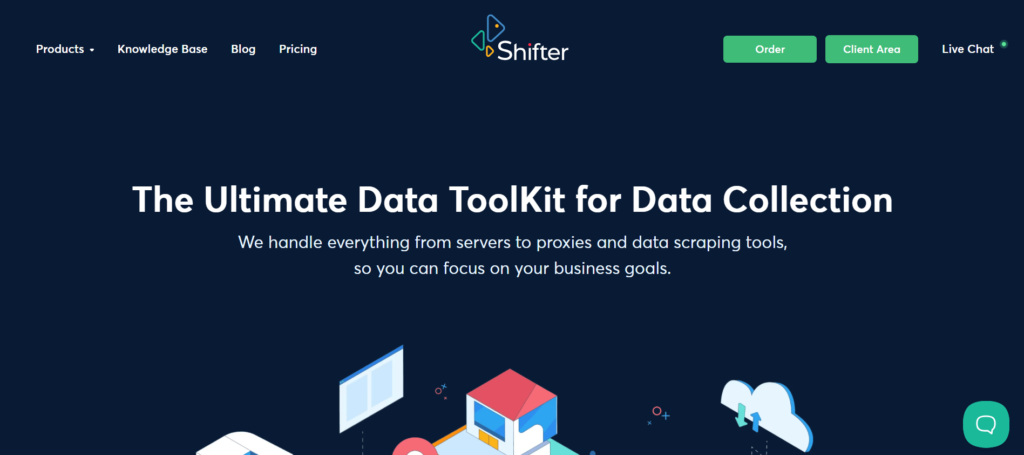
Shifter, previously known as Microleaves, has one of the oldest and largest rotating residential proxy networks.It gives users access to over 31 million household IP addresses globally. Shifter’s key advantage is its unlimited bandwidth plans, appealing to users with high data needs.
Its proxies rotate every 5 minutes and support HTTP/S and SOCKS protocols. Shifter is especially popular in the sneaker botting and ticketing communities for its stability and affordable pricing.
Features:
- 31M+ IPs with automatic rotation
- Unlimited bandwidth usage
- Global targeting and large pool variety
- Supports both HTTP and SOCKS5
- Simple proxy setup with minimal learning curve
Pricing:
- Starts at $249/month for 10 ports with unlimited bandwidth
10. Proxy-Cheap
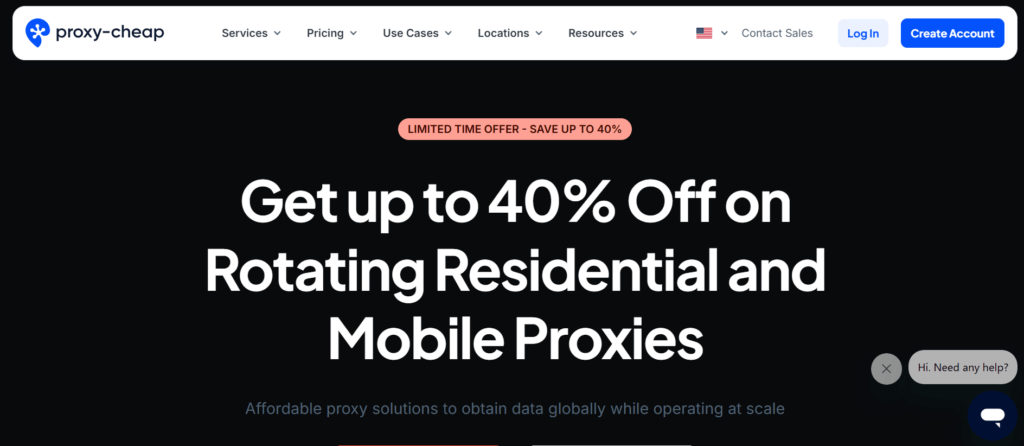
Proxy-Cheap is an emerging proxy provider that balances affordability and functionality. It offers over 6 million residential IPs with flexible pricing and no setup fees, targeting developers and startups. The service supports both rotating and sticky sessions with country-level targeting. Proxy-Cheap is suitable for SEO monitoring, price aggregation, and small-scale scraping tasks.
While it may not have the advanced tools of more established platforms, its competitive pricing and decent network quality make it appealing.
Features:
- 6M+ rotating residential IPs
- Global location support with session control
- No setup fees or contracts
- HTTP/HTTPS and SOCKS support
- Lightweight dashboard for quick setup
Pricing:
- Starts at $5/GB with discounts on higher volumes
11. Storm Proxies
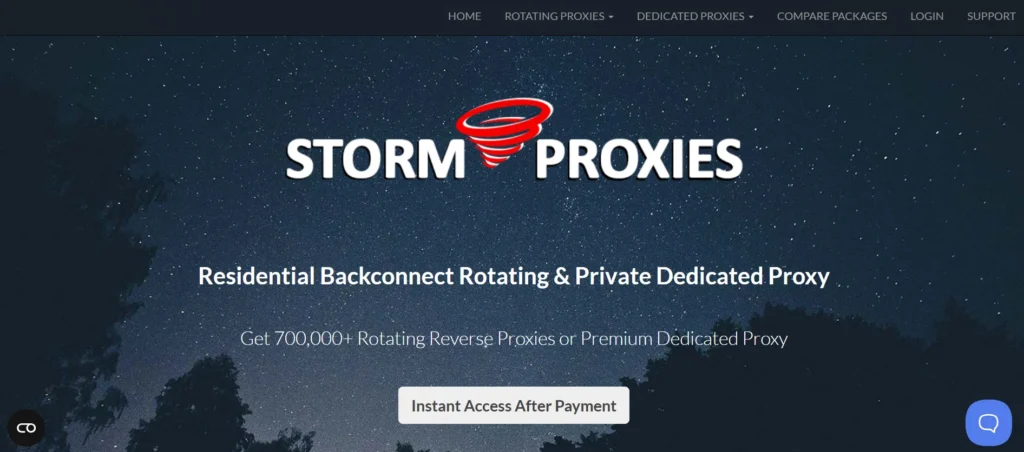
Storm Proxies specializes in offering affordable, beginner-friendly residential proxies aimed at small businesses, sneaker enthusiasts, and SEO professionals. Its pool includes hundreds of thousands of residential IPs primarily from the US and EU. While smaller than enterprise-grade networks, Storm Proxies excels in simplicity, quick setup, and budget accessibility.
It supports rotating residential proxies that refresh every 5 minutes, making it well-suited for low- to mid-scale scraping tasks, local testing, and bypassing IP blocks on smaller sites.
Features:
- US/EU-based residential IP pool
- 5-minute rotating proxy sessions
- Unlimited bandwidth in select plans
- Supports HTTP/S with quick deployment
- No complex setup or account limits
Pricing:
- Starts at $50/month for 5 ports; unlimited bandwidth
12. ProxyEmpire
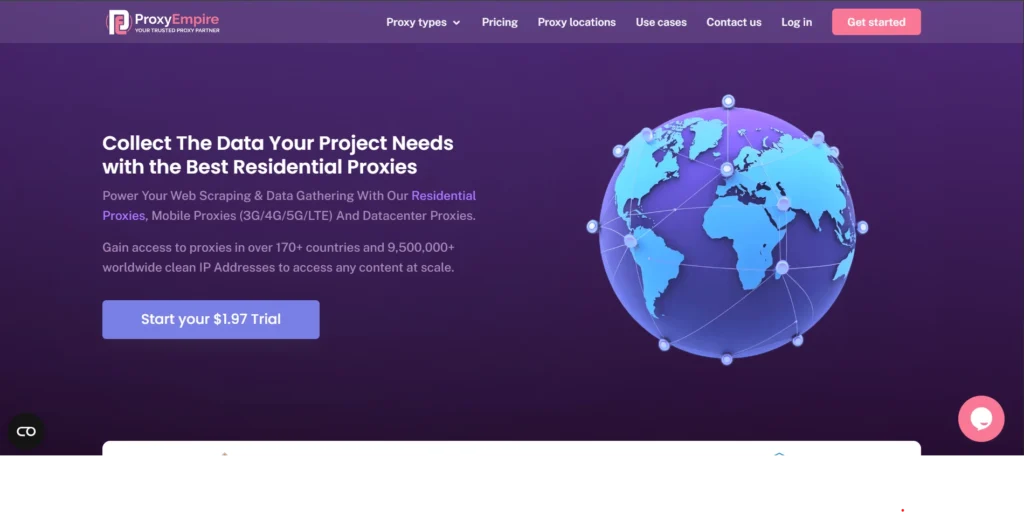
ProxyEmpire is an up-and-coming provider with over 5 million ethically sourced residential IPs and detailed targeting options. The platform gives users control over IP sessions, including sticky and rotating sessions, and lets you filter by country, city, and ASN.
Its well-documented API, advanced analytics, and user-friendly interface make it accessible for both individual developers and research teams. ProxyEmpire is especially popular for travel fare monitoring, localized SEO audits, and influencer analytics.
Features:
- 5M+ residential IPs with granular geotargeting
- Country, city, and ASN filters
- Real-time analytics and IP rotation tools
- Pay-as-you-go or monthly subscription options
- Ethical sourcing with transparent traffic routing
Pricing:
- Starts at $2/GB with packages scaling by volume
13. Zyte (previously Scrapy Cloud)
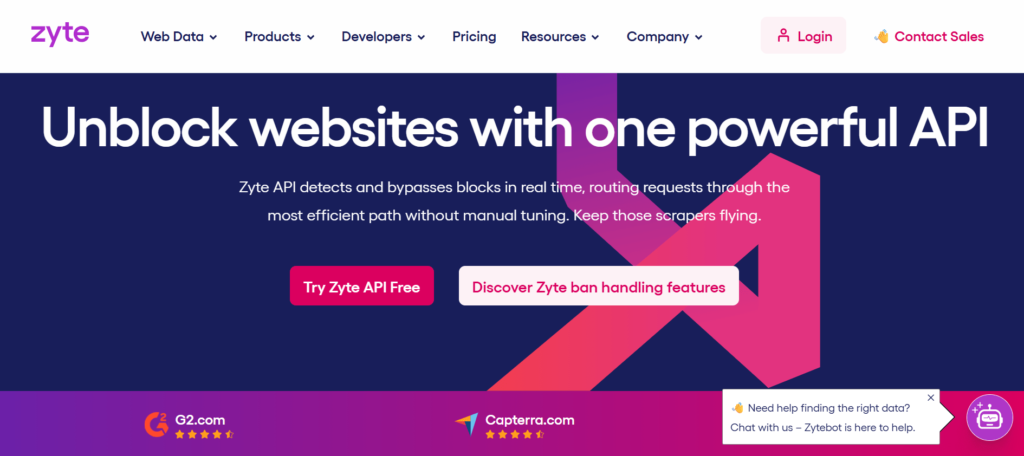
Zyte is a known data extraction platform that provides residential proxies within its cloud scraping infrastructure. Instead of operating as a standalone proxy network, Zyte integrates its proxies with advanced scraping tools and smart request routing.
This allows users to extract data without worrying about bans or captchas. It emphasizes high success rates and user-friendliness, making it ideal for non-technical users or teams that need to scale quickly. Its proxy management is automated and backed by machine learning to optimize requests in real time.
Features:
- Integrated with smart scraping services
- Automated proxy rotation and management
- High success rate for complex targets
- Smart request routing with CAPTCHA avoidance
- Developer-friendly APIs and workflows
Pricing:
- Proxies included in Smart Proxy Manager
- Starts at $29/month
14. Webshare
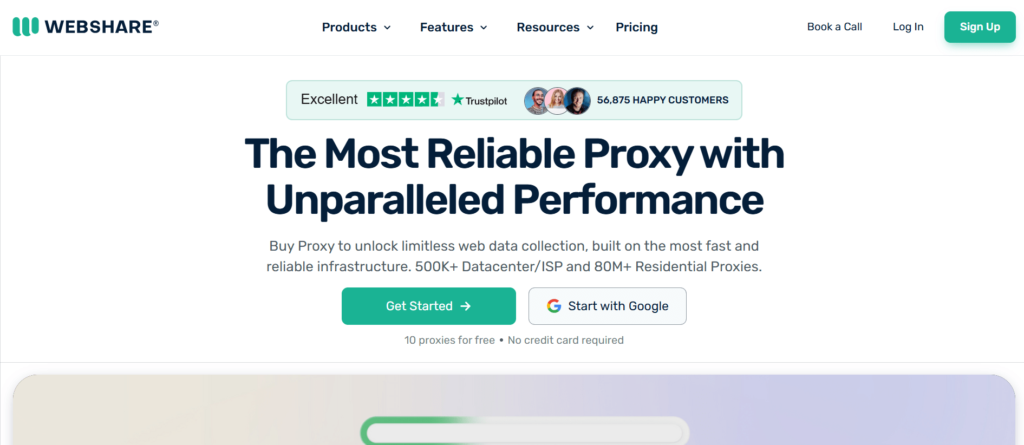
Webshare offers both datacenter and residential proxies, with its residential network gaining traction for affordability and straightforward setup. The residential IP pool contains millions of addresses worldwide, and users can choose between rotating or sticky sessions.
Webshare’s key benefit is its modular pricing model, allowing you to pay for exactly what you use without bundled charges. The platform is ideal for SEO tracking, localized content testing, and data collection for small to mid-sized projects.
Features:
- Global residential proxy network
- Rotating and sticky sessions
- Country-based targeting
- Modular pricing with flexible limits
- Detailed usage logs and proxy health metrics
Pricing:
- Residential proxy plans start at $7.50/GB
15. Proxyrack
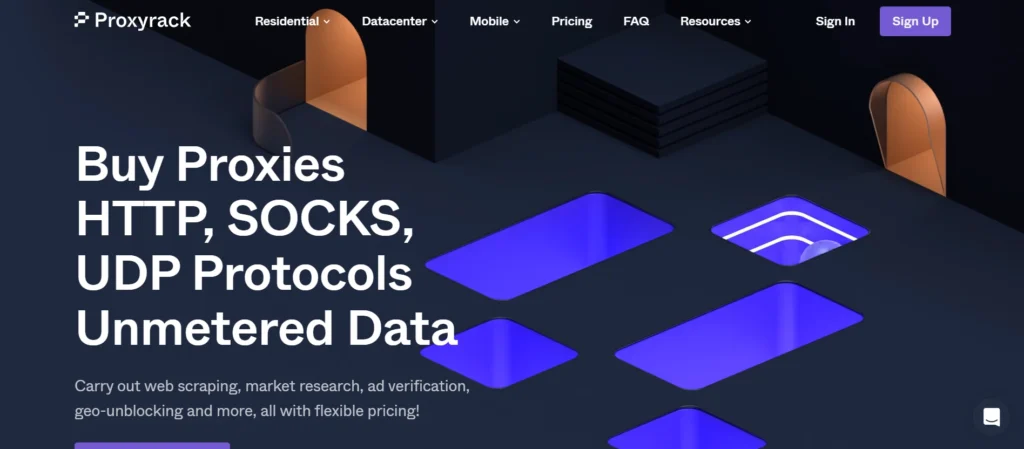
Proxyrack is a flexible proxy provider with access to millions of residential IPs and offers unlimited bandwidth plans. It is known for supporting HTTP, HTTPS, and SOCKS protocols and is favored by users seeking both value and features.
Proxyrack supports random IP rotation and sticky sessions, making it useful for ad intelligence, academic research, and social media monitoring. The platform’s support team and helpful documentation ensure smooth onboarding, even for beginners.
Features:
- Residential proxies with SOCKS/HTTPS/HTTP support
- Unlimited bandwidth options
- Global IP pool with country selection
- Sticky and rotating session control
- Easy integration and 24/7 support
Pricing:
- Starts at $99/month for residential proxies
The Future of Residential Proxy Networks
The residential proxy market is changing quickly, fueled by increasing demand for scalable and discreet internet access. As websites adopt more sophisticated bot detection methods using machine learning and behavioral analytics, proxy providers are responding by creating smarter routing systems, AI-based request managers, and dynamic IP reputations.
There’s also a trend toward privacy-first infrastructure. Some vendors are developing blockchain-based proxy marketplaces or tokenized access to residential IPs. These decentralized solutions aim to increase transparency and provide fairer rewards for IP contributors while lowering the risk of abuse.
Moreover, integrating residential proxies into broader cloud automation platforms is expected to increase. Tools that previously required manual proxy configuration are now including proxy management directly into scraping or analytics dashboards, making it easier for non-technical users to get value without in-depth network knowledge.
As regulatory scrutiny intensifies, especially in the EU and US, proxy vendors will face pressure to enhance compliance regarding data usage, ethical sourcing, and traffic redirection. Vendors that combine an ethical approach with strong technical performance will lead the next wave of adoption.
Conclusion
Residential proxies are no longer just tools for hackers or data hoarders; they are essential for digital operations today. Whether you’re scraping prices, monitoring ads, managing social media, or researching global markets, residential proxies help you access the internet as real users do. Their authenticity, flexibility, and geolocation options make them the preferred choice over datacenter or mobile proxies in most situations.
Choosing the right residential proxy provider involves evaluating pool quality, session control, targeting accuracy, performance, and ethics. With the market becoming more competitive, users can access better choices, improved transparency, and smarter tools than ever before.
By understanding this ecosystem and aligning your selection with your project needs, you can achieve unmatched scale, reliability, and stealth—without crossing into unethical territory. The residential proxy is no longer a hidden tool; it’s now a strategic asset for any data-driven organization.
FAQs
1. What is a residential proxy?
A residential proxy is an intermediary that uses an IP address assigned by an Internet Service Provider (ISP) to a real device, like a desktop or mobile phone. When you route your internet activity through a residential proxy, websites see the traffic as coming from a legitimate home user. This gives your requests higher credibility and reduces the chance of blocks or CAPTCHA. Residential proxies are commonly used for tasks that require stealth, such as web scraping or ad verification.
2. How are residential proxies different from datacenter proxies?
The IP address’s source is the primary distinction. Datacenter proxies employ IPs from virtual computers housed in data centers, whereas residential proxies use IPs from actual consumer devices. Residential proxies hence provide more anonymity and reduced detection rates. Datacenter proxies are faster and more cost-effective, but they’re more likely to be flagged by websites, especially those with strict anti-bot systems.
3. Are residential proxies legal to use?
Yes, residential proxies are legal when used for ethical and compliant purposes, such as market research, SEO auditing, or brand protection. However, the legality depends on the provider’s IP sourcing methods and how you use the service. Reputable providers obtain IPs through opt-in networks or consent-based partnerships. Activities like fraud, unauthorized data access, or bypassing copyright restrictions are illegal, regardless of the proxy type.
4. Why are residential proxies superior for web scraping?
Residential proxies are ideal for web scraping because they mimic real-user behavior and make it harder for target websites to detect automated requests. When scraping large volumes of data, rotating through genuine residential IPs helps avoid IP bans, CAPTCHA, and geo-restrictions. This allows for more efficient and uninterrupted data extraction from platforms like search engines, e-commerce sites, and social networks.
5. What is a rotating residential proxy?
A rotating residential proxy automatically changes the IP address used at fixed intervals or after each request. This rotation adds an extra layer of anonymity by constantly shifting the user’s digital fingerprint. It’s especially useful for high-volume scraping, ad verification, and data mining, where using the same IP repeatedly could lead to bans or throttling.

